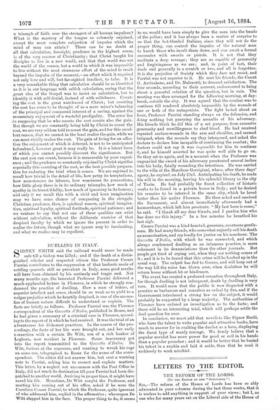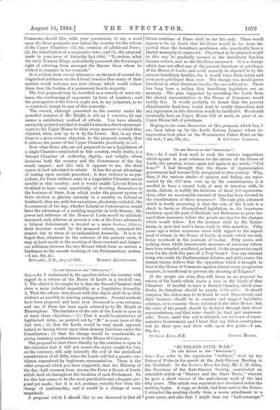LETTERS TO THE EDITOR.
THE REFORM OF THE LORDS.
[To THE EDITOR OF THE " SPECTATOR." I
Sin,—The reform of the House of Lords has been so ably advocated in your columns during the last three weeks, that it is useless to add anything in support of your views ; but I, as one who for many years sat on the Liberal side of the House of
Commons, should like, with your permission, to say a word upon the three proposals now before the country for the reform of the Upper Chamber—(1), the creation of additional Peers; (2), the introduction of a suspensive veto ; and (3), the proposal made in your issue of Saturday last (9th), "To restore, what the early Norman Kings undoubtedly possessed, the Sovereign's right of selecting from amongst the Barons those whom he wished to summon to his counsels."
It is evident from recent utterances on the part of several dis- tinguished noblemen on the Liberal benches that many of their number would welcome any wise change which would relieve them from the burden of a permanent hostile majority.
The first proposal may be described as a remedy of mere vio- lence, the overbearing of opponents by force of numbers ; and the prerogative of the Crown ought not, in my judgment, to be so exercised, except in case of dire necessity.
The second, although presented to the country under the powerful auspices of Mr. Bright, is not, as I conceive, by any means a satisfactory method of reform. You have already succinctly pointed out that it would be almost a direct encourage- ment to the Upper House to delay every measure to which they objected, when sent up to it by the Lower. But, in my view, there is a more serious objection to the proposal, namely, that it reduces the power of the Upper Chamber practically to nil.
Now what those, who are not prepared to see a Legislature of a single Chamber established in this country, really desire, is a Second Chamber of authority, dignity, and weight, whose decisions both the country and the Government of the day would respect ; and this end, it appears to me, the third course is best calculated to attain. It has the great advantage of resting upon ancient precedent ; it does violence to no pre- judices, for Peers without seats in a Legislative Chamber• are no novelty in this country ; and it would enable Liberal Peers in Scotland to have some opportunity of devoting themselves to the business of State, from which under the present system of their election (a glaring anomaly in a country so Liberal as Scotland), they are, with few exceptions, absolutely excluded ; the Government of the day, whether Liberal or Conservative, would have the advantage of a working majority in both Houses ; the power and influence of the House of Lords would be infinitely increased, and, whereas at present a vote of the Peers adverse to a Liberal Government, is treated as a mere brutum fulnzen, their decisions would, by the proposed reform, command the respect due to those of an independent Assembly. It is to be hoped that, whatever be the outcome of the present crisis, it may at least result in the averting of those constant and danger. ous collisions between the two Houses which form so serious a hindrance to the smooth working of our Parliamentary system.
—I am, Sir, &c.,



































 Previous page
Previous page